The fundamental necessity of being a professional SEO writer is to get clarity about what the user wants from a search query. Every time you enter a string of queries on a search engine – you intend to get a certain kind of response.
As writers, knowing how to predict search patterns goes a long way in the digital marketing industry. It allows you to align your blogs with the search intent of the user and produce crisp and helpful SEO-friendly content.
Who are SEO Writers?
SEO writers are the kind of content writers who write for website pages, in a way that they are optimised to rank on the Google Search Engine. SEO or search engine optimisation is a set of procedures that make content easier to reach its audience.
Therefore, professional SEO writers use several content optimization strategies to write content that boosts a website’s ranking. Some of the key factors that play a role here are keyword density, content structure, voice/tone of the content, style, and readability.
Das Writing Services houses some of the best professional SEO writers who keep the updated SEO guidelines and standards into account while crafting personalised and unique content for your brand’s needs. To get a free sample from us, get in touch!
Top 7 SEO Writing Tips
Being good at the job of a writer is a slow and steady process. Like any other skill, it takes time to develop in the field of SEO writing.
However, based on our expertise, there are certain rules you can keep in mind to do a quality job.
Let’s find out below.
1. Write for Humans
Generally, when it comes to SEO writing, your target audience will mostly comprise your client base. They can either be other businesses (B2B) or individual customers (B2C).
So, keeping your audience in mind try to keep that information in the writing aligned with the keyword and its intent.
We have often noticed that beginners face this problem where in the attempt to optimize, they tend to over-optimize content.
The results? Mechanical writing with frequent repetitions which ends up affecting the reading experience.
On the way to optimizing content for search engines, we cannot lose the objective of the writing. After all, we write to be read by people, not by search engines.
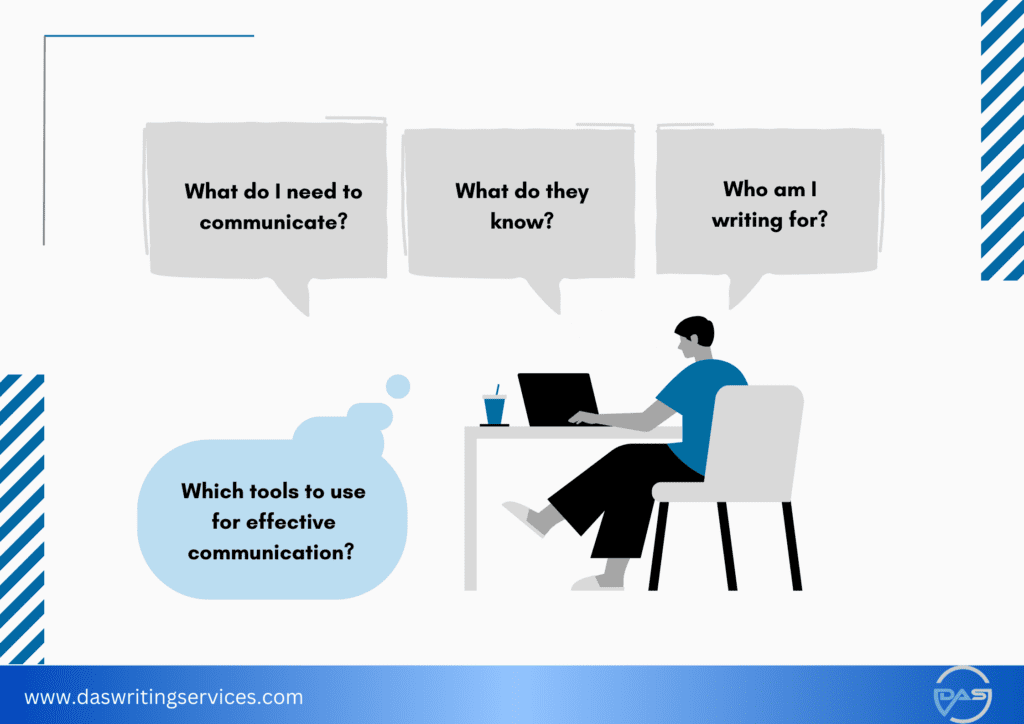
So, it is a good idea to ask the following questions before writing – who am I writing for? How much do they already know, how much should they know? Finally, what tools do I need to use to communicate my information effectively?
Once that is figured out, start with your content and try to answer these questions.
2. Research First, Write Later
Research is one of the primary skills needed in SEO content writing. Having a comprehensive knowledge of a particular topic helps you write with confidence and deliver the information effectively.
Look for the information keeping in mind the reader and questions mentioned in the previous pointer. Gather examples and case studies if you think it is needed to explain your topic effectively.
Plan the flow of information, separate the wheat from the chaff – and then, only then go ahead and start writing.
3. Contribute Value with your Content
One of the most important aspects of writing for an online audience is to make it helpful. Whether you are writing to close in on a sale or just to inform – your SEO content must target to solve user problems.
Helpful contents have an increased CTR (click-through rate) and help establish authority. In the long run, it improves the dwell time of your website to create sustainable positive impact.
4. Get Familiar with SEO Ranking Factors
Writing for the internet involves its own pros and cons. While the publication process is easier and less time-consuming, there are some rules to crack the method of SEO writing effectively.
Search engine giants like Google use a whole set of tools to automatically filter out valuable SEO contents. With algorithms like RankBrain and Hummingbird – Google differentiates between helpful and thin content.
There are more than 100 factors that determine the ranking of a page on SERP. Having an understanding of the various factors like helpful content and E-E-A-T are crucial to get solid ranks.
5. Establish Authority
It is practically impossible for a single person to be an authority in everything. There must be a niche or domain where you feel most comfortable – work on that area and build a comprehensive knowledge.
This not only helps you write better SEO friendly articles but also allows you to claim authority and expertise in the field. Aside from building your reputation, this helps you get a steady flow of audience to your posts.
6. Incorporate Long Tail Keywords
Although long tail keywords tend to have less search volume, they are more effective in ranking against specific search queries. This ensures that you receive intent specific traffic and get highly convertible audience.
Long tail keywords are especially helpful in highly competitive industries – by specifying the context of a search, they allow you to get increased visibility.
7. Optimize your Headers
Having well optimised headers are a necessary step to producing high ranking SEO content. Formulating question based subheads help you rank against long search strings.
Also, you may consider adding attention-grabbing power words like “best”, “fast”, “extra” to your meta title to get more clicks from SERP.
SEO Content Writing vs Copywriting
While many like to use these terms interchangeably, there are a few key differences between SEO Content and Copywriting. Ultimately both are used for marketing, but the key difference is in the approach. Confusing the two can lead to ineffective promotional campaigns producing below-average results.
| SEO Content Writing | Copywriting |
| 1. Primary goal is to inform the visitor. | 1. Primary goal is to attract and convert the visitor |
| 2.Uses long-form informational content. | 2. Uses short, witty write-ups to convert readers. |
| 3. It targets informational search intent. | 3. It targets transactional search intent. |
| 4. Improves ranking and organic traffic. | 4. Gathers email subscribers and leads. |
| 5. SEO knowledge is a must. | 5. SEO knowledge is not mandatory. |
In this blog, we have focused only on SEO content writing. Let us know via comments if you would like to learn more about copywriting.
Key Steps SEO Content Writers Take to Optimize Content
Most search-engine-optimized content is produced to rank on the SERP and drive user traffic to the website. So, following a well-defined method is crucial in SEO writing to get the desired benefits.
Here is a step-by-step guide to writing effectively with a keen eye for search engine optimization.
Step 1: Research Keywords
It is safe to say that research comes long before writing. A robust research strategy is the primary step to optimizing both your on-page and off-page content.
So, start with using any of the keyword research tools to browse the topics associated with your business domain. Choose your topic and determine the right keyword for you by browsing the keyword research tool.
For instance, suppose we are dealing with electric toothbrushes and have to write an article about it. So, let us search for the same in the keyword generator tool.
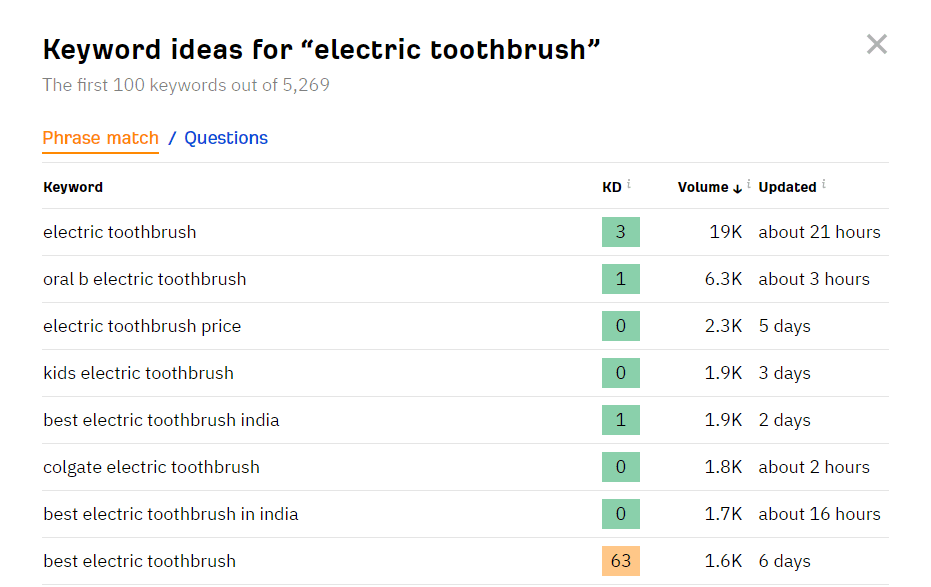
As we can see – the market for electric toothbrushes is at a very foundational stage in India; with high search volume and little to no keyword difficulty at all. So, any content on electric toothbrushes would be fairly easy to rank in the Indian market.
Let us take an opposite example where the keyword is the same, but the location is different.
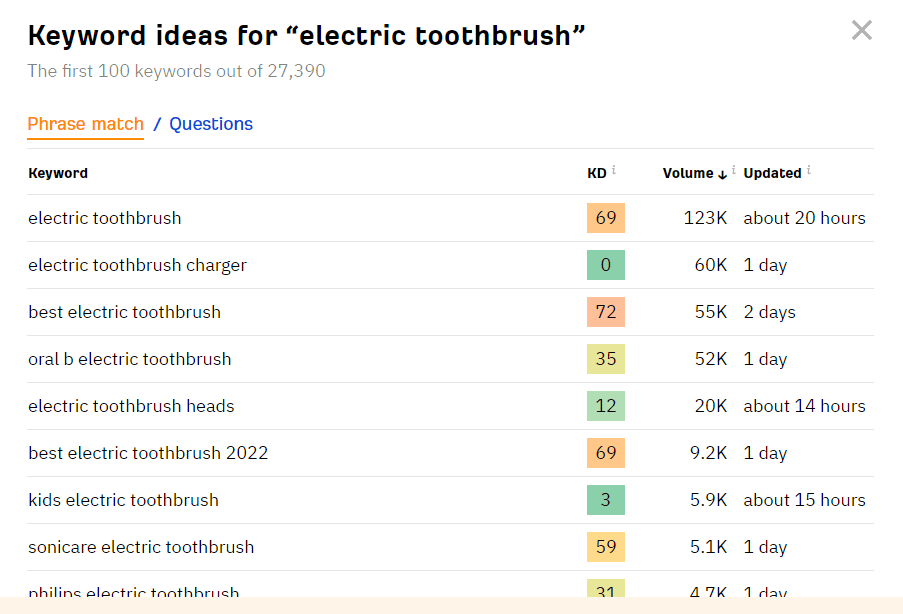
Compared to the Indian market, the US market is already saturated with electric toothbrushes. The same results are indicated in the keyword generator tool with a higher search volume. Further, the keyword difficulty is 69 – meaning it will be considerably difficult to rank with this keyword on the SERP.
This example helps us draw two conclusions. First, the value and importance of a keyword is location specific – one keyword that proves convenient for a particular region, won’t be useful for another.
Secondly, when the research is right – writing is more effective in engaging the desired audience. A well-researched content targets and exploits the knowledge gap in the market and makes its place on search engine results.
Refer to this video to find about the best keyword research tools for SEO writers.
Step 2: Curate the Content Structure
Properly structured content is the most important criterion of writing for the internet. It helps SEO writers to stay within the prescribed range of words. While covering the important points and ideas – it allows a proper flow of information and effective and concise writing.
So, make sure to create a list of pointers keywords and relevant data before starting to write your content.
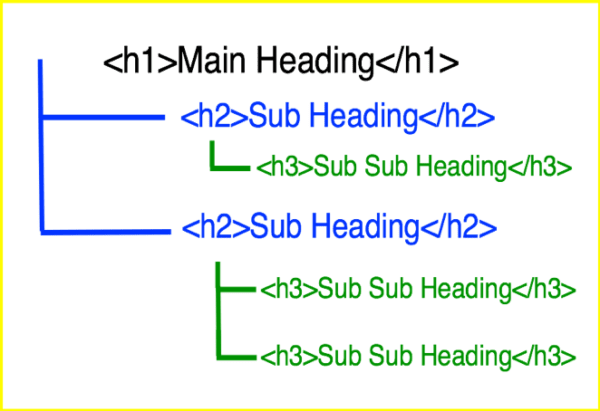
Step 3: Write Effectively
Once the keyword research and structuring are done, you can start writing your content. Chunky paragraphs are a no-go zone which negatively impacts your impression and rankings – it does not matter how informative your content is.

On the left, we have web-optimized content with crisp paragraphs and small sentences. It is also visually appealing – because of bullet points and embedded video. On the right – there is a research article. They are on the same topic; which one do you think is easier to read?
The research article – irrespective of the depth of knowledge and its expertise is still a difficult piece to read through. That is because of chunky paragraphs and specialised jargon. Especially when writing for the internet, it is important to follow a precise and easily readable structure of the content.
Step 4: Create Links
To get a higher rank on SERP, links play a major role. They are a vital part of your off-page SEO strategy. Websites that have backlinks from quality websites are more likely to get better ranks. Whether you acquire hyperlinks or place outbound links on your web page – it is crucial to do it right.
Choose only relevant websites to link to your blog or article. Also, while placing links – the anchor text is important to get good results.
Beware of black hat SEO techniques like purchasing backlinks, they are discouraged in Google’s Search Essentials link spam policy and may lead to penalties.
On the way to optimize the content, it is always a good idea to place appropriate internal links. Internal links allow search engine crawlers to understand the relationship between your blogs and articles.
A properly interlinked website establishes a connection among the topics and also increases the overall dwell time of the user.
Step 5: Optimize Meta tags and Alt text
Optimizing the meta title and description seems like the job of an SEO Analyst – well, it is. But it is crucial for SEO-trained writers to take matters into their own hands. After all, you are the writer of the content and know it the best.
So, having an idea about meta tags and alt text optimization gives you an added edge over the content. To determine how it is seen by the search engine crawlers. They also shape a reader’s first impression – making it the most important part of a blog or article to maintain a healthy click-through rate.
Characteristics of SEO Writing (With Examples)
As content marketing becomes the de facto organic marketing strategy to get leads, getting a noticeable rank on the SERP is becoming a challenging task. While domain authority and brand popularity play a decisive role in ranking – well-written content can bypass all that to rank at the top of search engines.
So, how do you know that your content is optimized for readers? Here is a checklist with examples to see if your SEO writers are producing quality content. Read along to find out:
Easy to Read
Readability is an important factor in optimizing your content. The readability factor affects the dwell time of your visitors – if your content does not express your ideas in simple readable language.
Therefore, well-optimized content is always simple to read and offers all the relevant information in a crisp manner.
Popular tools like Grammarly and Yoast SEO checker prove useful for checking the readability of an article on the internet.
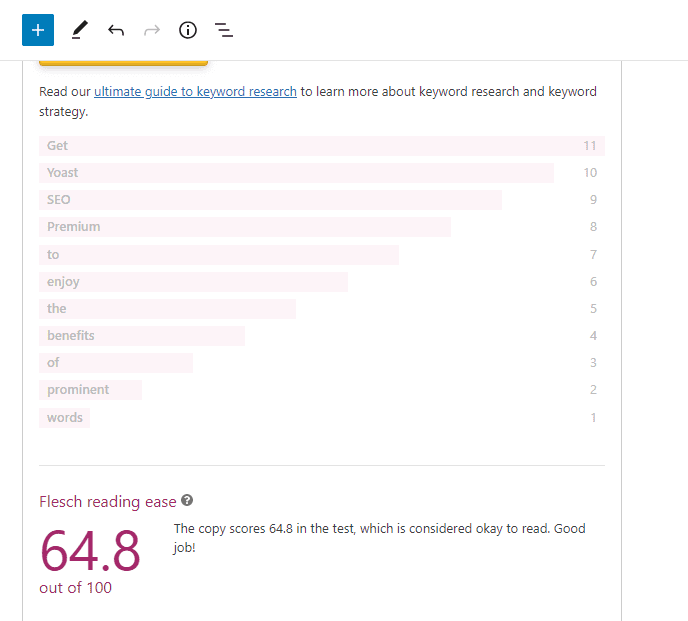
A score above 50-60 is most appreciated in the Flesch reading ease tool in Yoast.
Further, a similar tool is available in the Grammarly app. As per the app, a readability score of 60-70 is best to serve readers across all ages and countries.
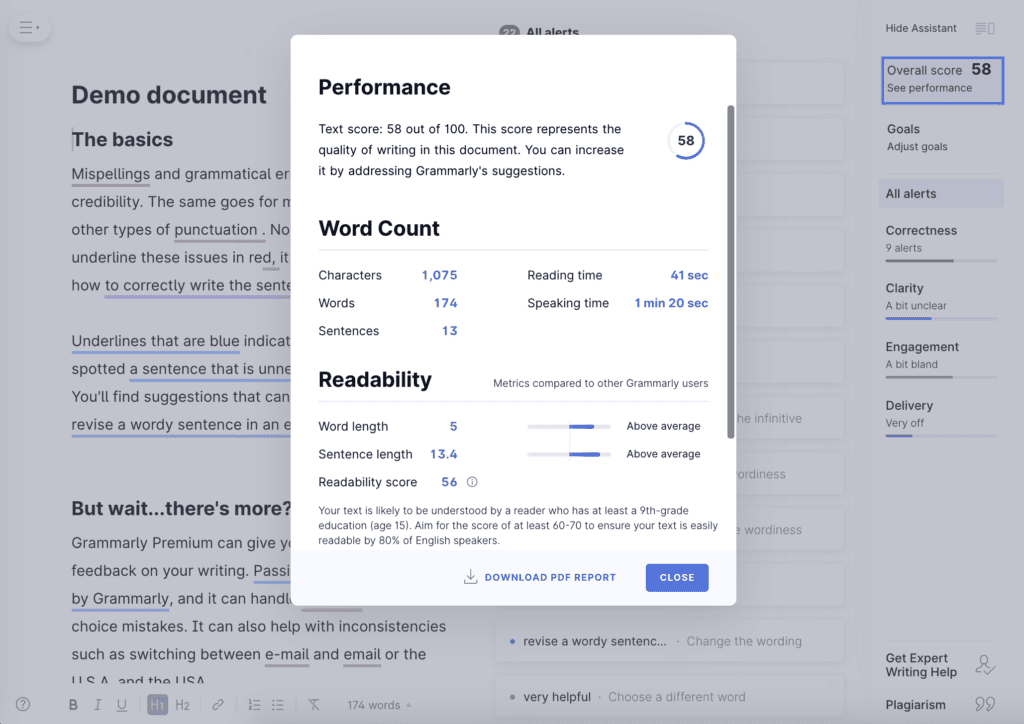
Together, an average score above 50 in both tools indicates that an article or content has easy readability.
Conversational Tone
You can definitely write in the most elaborate and professional English. But in order for content to be effective and easy to follow – maintaining a conversational tonality is the best practice.
Catchy Titles and Subheads
Well-optimized content is always favoured by both search engines as well as users. While keeping the SEO factors in mind like keyword density and semantic indexing, it has to appeal to the audience as well.

Look at the title and the subhead from the Search Engine Journal. The listicle article uses the odd number 7 to catch the attention of the audience. Also, it uses powerful adjectives like “Amazing” and “Captivate” to put emphasis on the argument itself.
Some of the most popular techniques to optimize your content are using Power words in the meta title and descriptions. They are proven to increase CTR and offer maximum ROI.
Inverted Pyramid Structure
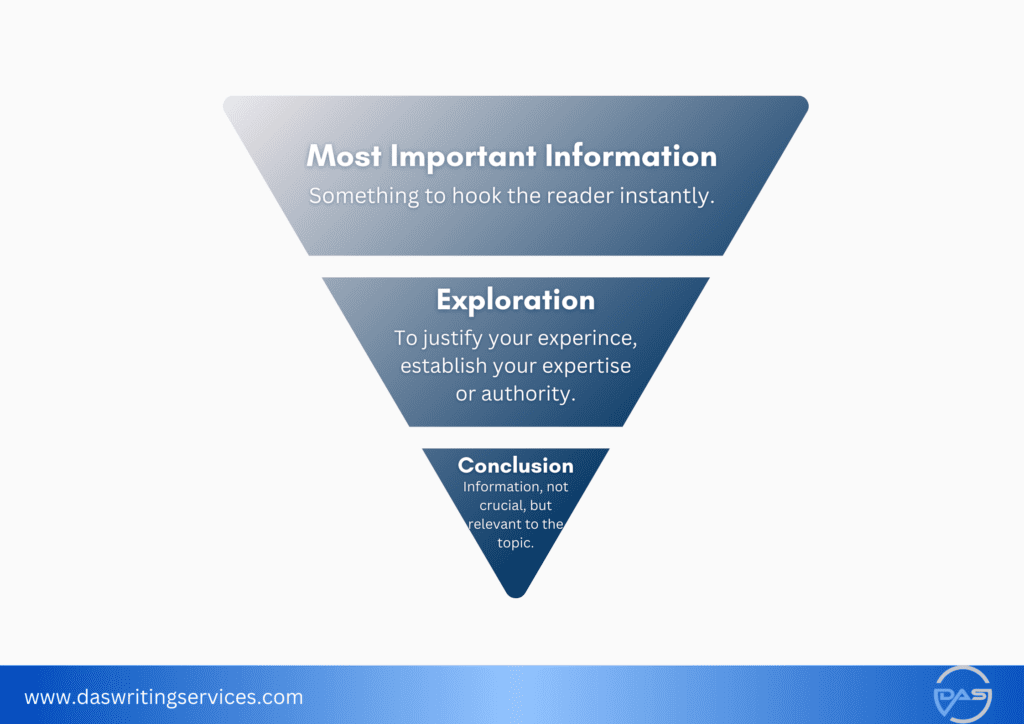
This is the cardinal rule in the journalism industry. However, nowadays it applies to the SEO writing industry as well. Following an inverted pyramid model in SEO means you give all your vital information in the part of the content and then go on to elaborate them maintaining a natural flow of the topic.
Besides this, you can always look at the website metrics like bounce rate and dwell time. They allow you an insight into the reader’s activity – to understand if your content is actually helping the reader or not.
Top Skills of SEO Writers
When making a career in SEO writing, one has to be versatile and open to learning new things. Most of the skills associated with writing are acquired on the job. The following skill sets are compulsory and common is seasoned professionals:
Understand Search Intent
Having a clear understanding of what a user is looking for on the internet is crucial for writing. While the internet is filled with thousands of web pages on the same topic – not all of them get a rank on the search engines.
Firstly, that is not practically possible. Secondly, not all content can actually serve the intention of the user.
Backlinko divides search intent into four categories – informational, commercial, navigational, and transactional. That means all searches are done to produce any of the four results.
So when a person searches for “automatic watch price”, we can assume the user intends to buy the product.

The same is considered by search engines as well. The intent of the search is considered to be transactional. Hence, search results are from online retail stores.
So if you are going to length to describe the winding mechanism of a watch. Such a description is ill-fit for such a page; it should have a product description noting down the type of materials used and warranty to properly serve the intention of the user.
Varied Skills in Writing
The fundamental demand of SEO writers is the ability to be versatile with their skill set. When writing professionally for an audience – it is important to be able to adapt different styles of writing.
From product descriptions, copywriting, and creative writing, to educational content writing – a trained writer is expected to be a jack of all trades.
The skills of an experienced writer are proven with their ability to change the tonal approach as per the requirements.
Research Skills
This is the most essential quality in any kind of professional writer. Without the ability to research the ins and outs of a topic – it is not possible to produce high-value and engaging content.
The quality of content is judged based on two factors – its ability to retain users on the page, and simultaneously offering necessary information in the most lucid way possible.
Write around Keywords
One of the primary skills necessary in SEO writing is the ability to write a copy around a set of keywords. Focusing on the right type of keywords for your industry is important to drive traffic and produce leads.
While writing a blog, it is always a good idea to maintain a keyword density of 0.5% to 1.5%. You can use keyword research tools from Google or Ahrefs.com to get an idea about the search volume of your keywords.
If you are having a hard time wrapping your mind around the topics, you can definitely start with some of the popular tools out there. Neil Patel’s ‘Answer the Public’ works like a charm for beginning SEO writers.
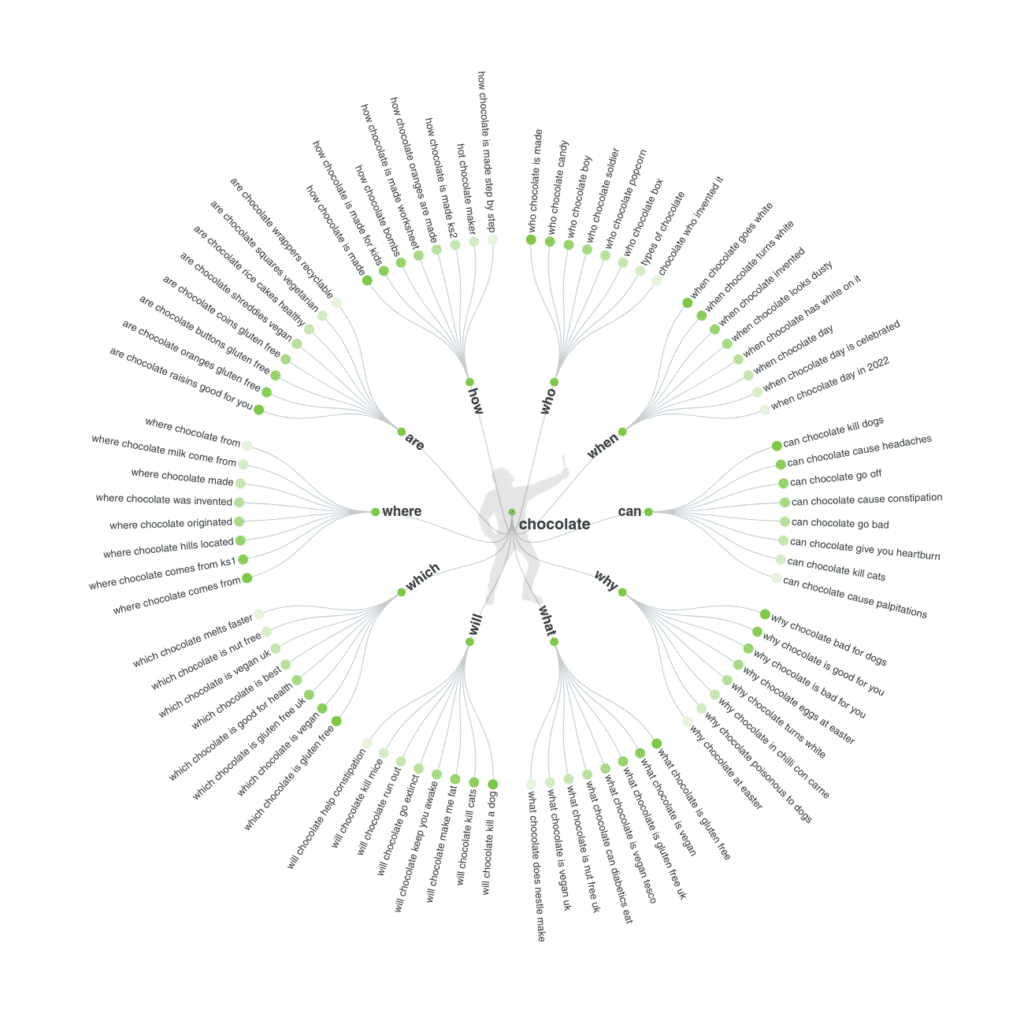
Enter your primary keyword in the search bar and get a wheel of topics generated. It will help you choose the right topic for your website blog. Also, you can get proper metrics on the website such as keyword volume, difficulty and search trends. Therefore you get a pretty accurate idea about the potential performance of your content once it goes live.
Further, to improve the ranking factor of your content – it is always better to incorporate LSI keywords in your content to improve your overall visibility.
Will AI Replace SEO Writers?
As different AI-based applications are entering the market – there are many apprehensions. The talk of the town is if Artificial Intelligence is going to replace the need for humans in different industries.
Well, we thought why not ask the question to an AI itself and see the results?
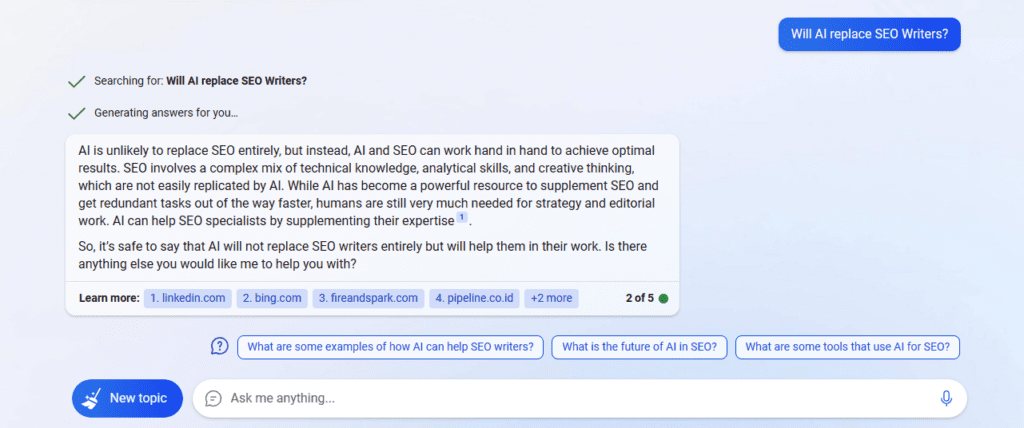
Despite its best efforts, we can see that the AI fails to understand the intention behind the search. It is unable to see the connection between SEO and writing and only offers a generic answer regarding search engine optimization.
So, even if AI takes over, there is little possibility that it can match the workings of the human mind. When it comes to writing for an audience, content written by actual humans showcases expertise and authority.
Such organic optimised content has more possibility to engage readers and create higher chances of conversions. Hence, hiring a professional copywriter is always beneficial to give a boost to your organic marketing strategy.
Takeaway
So, having read through the various important factors for SEO writers, you should be able to curate the desired blogs and articles for your website. However, it is a good idea to consult with an expert in the field with your content plan. It prevents unwanted circumstances at a later period and saves your precious time.
With Das Writing Services, all you have to do is specify your content requirement and intent and we will craft the best SEO-optimised web copy that aligns with your brand and ranks in the SERP. Contact us for a free sample today.
Frequently Asked Questions
1. What is SEO in freelance writing?
Entrepreneurs and small businesses hire freelance SEO writers to promote their brands on the Internet. Writers offer search engine optimized content that ranks high on search engines and drives traffic to the website.
2. Is SEO writing a skill?
Good search engine-optimized content also needs to engage and inform the audience. This is an acquired skill set that matures over time. Experienced content writers can curate the right tone and address the pains of the audience so as to establish trust and reliability.
3. How much do SEO writers cost?
Depending on the experience and level of expertise, such writers can cost Rs. 60,000 to Rs. 3,00,000 per year in the international market.
4. Can I do SEO on my own?
If you are just starting, you can choose to optimize your content for search engines on your own. However, as you grow big, it is always a good idea to seek professional services to get seamless results.
5. How do I become an SEO writer?
You can become an SEO writer by following the below-mentioned pointers:
- Study about SEO and market trends
- Get hands-on experience and build your own portfolio
- Scan social media platforms for contemporary ideas
- Acquire research skills in your field
Pursuing these skills with due diligence makes you a highly desired and successful SEO writer.

Ritish Dutta is a seasoned Content Developer with over 7 years of experience in the industry. Currently, at Das Writing Services, he writes SEO-optimized content that caters to our diverse clientele. Ritish utilizes his critical insights and experience to talk about digital marketing, SEO content writing, content strategy, and AI.

Ritish Dutta is a seasoned Content Developer with over 7 years of experience in the industry. Currently, at Das Writing Services, he writes SEO-optimized content that caters to our diverse clientele. Ritish utilizes his critical insights and experience to talk about digital marketing, SEO content writing, content strategy, and AI.




Leave a comment
All comments
Arghish Das
This is a really helpful guide for SEO writers! I especially liked the part about writing for humans and not just search engines. Would you consider writing a post on copywriting? I'd be interested to learn more about the differences between the two. Thanks for sharing!